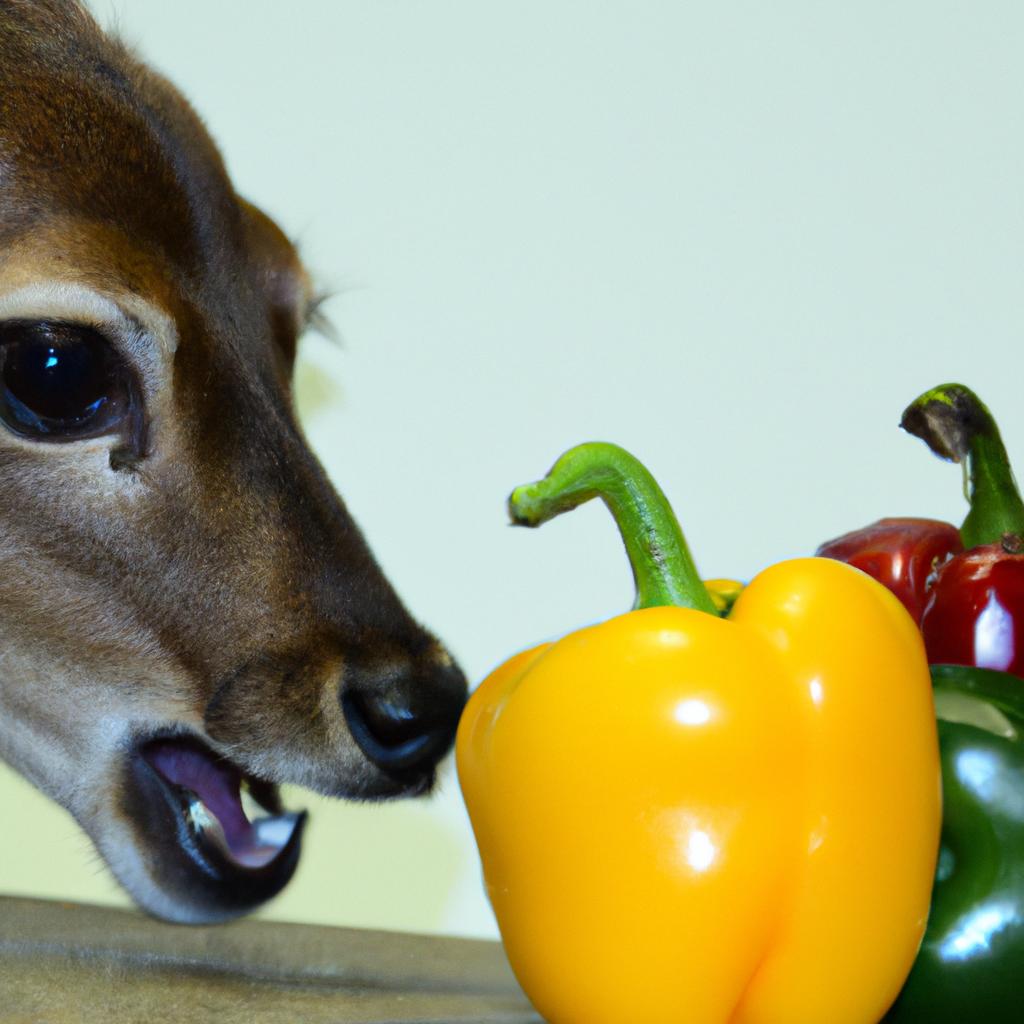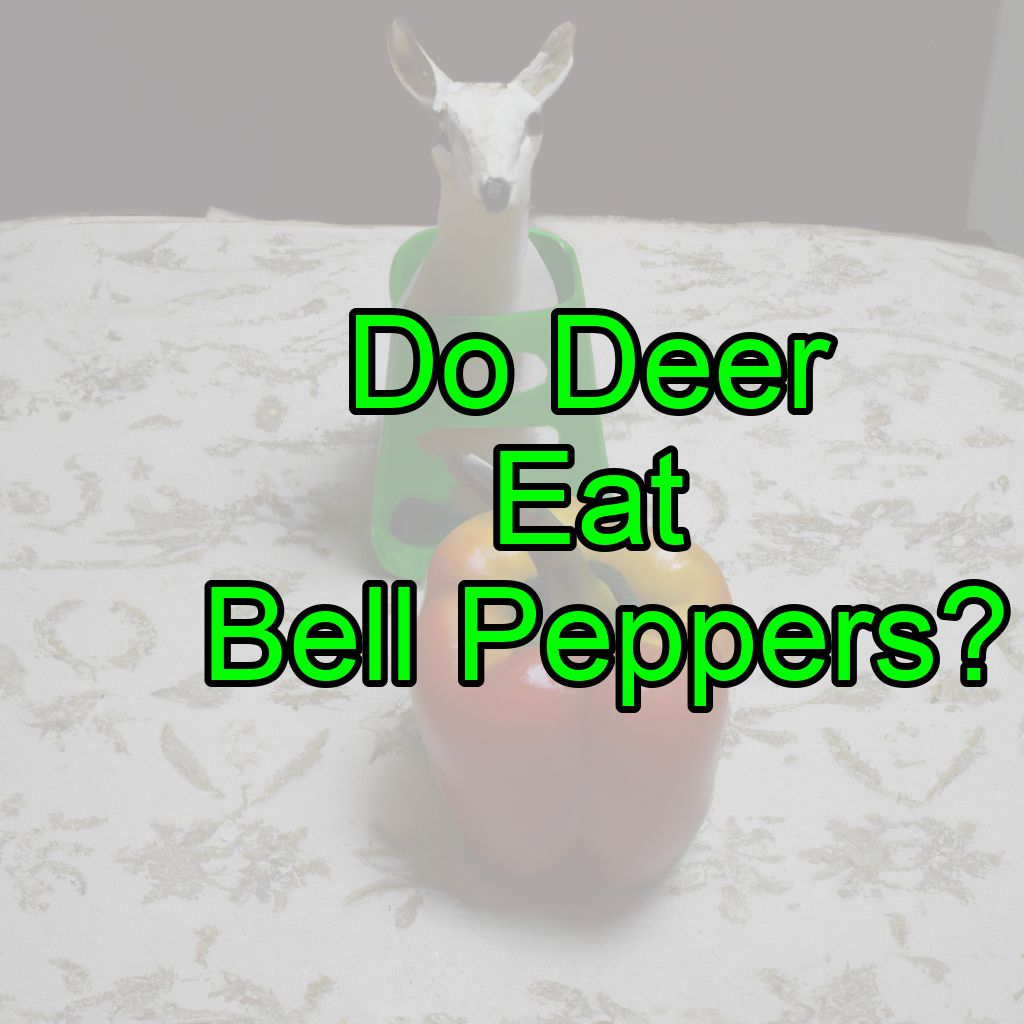As a garden owner, I have always been curious about the types of animals that might be interested in the produce of my hard work.
Bell peppers are one of my favorite vegetables to grow, and I have often wondered whether deer would be attracted to them.
In this blog post, I will answer the question of whether deer eat bell peppers and explore the nuances of their dietary habits.
Contents
Yes, Deer Eat Bell Peppers
Deer are known to have a varied diet, and bell peppers are not exempt from their list of preferred foods. These animals are herbivores, meaning that their diet consists of plants and vegetation.
Although they are known to prefer browse and forbs, they have been known to nibble on fruits and vegetables, including bell peppers.
My observations
As a biologist and backyard owner with ample experience observing deer and their feeding habits, I can tell you that deer do indeed eat bell peppers. While it may seem surprising, these herbivorous animals have been known to venture into gardens and consume a variety of plants, including bell peppers.
To understand how deer eat bell peppers, it’s crucial to delve into their dietary preferences and adaptations. Deer are classified as grazers, meaning they primarily consume vegetation such as grasses, leaves, and shoots. However, they are also considered browsers, capable of feeding on a wider range of plant species, including those with tougher foliage.

When it comes to bell peppers, deer are attracted to their succulent and flavorful nature, as the peppers are rich in nutrients and moisture. In my own backyard, I’ve observed deer selectively nibbling on the bell pepper plants, indicating their preference for this particular crop. The sweet, juicy flesh of the peppers provides an enticing meal for these animals, especially during periods when alternative food sources may be scarce.
While deer are adept at utilizing their specialized dentition to extract nutrients from various plant structures, including tough vegetation, bell peppers pose an interesting challenge. The thick and often waxy skin of bell peppers can deter some herbivores due to its toughness and bitter taste. In my experience, I’ve noticed that deer typically avoid consuming the skin of bell peppers unless they are extremely hungry or have no other food options available.
Instead, deer tend to focus on the softer and more palatable parts of the bell pepper, such as the seeds and flesh. I’ve witnessed deer delicately nibbling around the edges of the bell pepper, carefully avoiding the tougher skin. They use their sharp incisors to bite into the pepper, extracting the seeds and the surrounding juicy portions, which are easier to digest.
It’s worth mentioning that deer have well-developed senses, particularly their sense of smell, which plays a significant role in their foraging behavior. They can detect the scent of ripe and aromatic bell peppers from a distance, drawing them towards these plants as a potential food source. In my backyard, I’ve observed deer being attracted to the aroma of the bell peppers, even before they physically reach the plants. This indicates that their keen sense of smell guides them towards their desired food items.
While deer consuming bell peppers may pose a challenge for backyard owners hoping to cultivate these plants, there are measures that can be taken to mitigate the impact. Erecting physical barriers, such as fences or netting, can help protect the plants from deer browsing. Additionally, using repellents with strong scents or tastes, specifically designed for deterring deer, can be effective in discouraging their consumption of bell peppers.
In conclusion, deer do eat bell peppers, albeit with some selectivity. These herbivorous animals are attracted to the taste, scent, and nutritional value of the flesh and seeds within the peppers. However, they tend to avoid consuming the tougher skin, focusing instead on the more tender parts. Understanding the feeding habits and preferences of deer can help backyard owners find suitable methods to protect their bell pepper plants while coexisting with these fascinating animals.
When Do Deer Eat Bell Peppers?
Deer are most likely to eat bell peppers during the late summer and early fall when the plants are producing ripe fruit.
They are also more likely to eat the peppers in areas where they are abundant, such as gardens and farms.
How Do Deer Eat Bell Peppers?
Deer use their front teeth to nip off pieces of the pepper, which they then chew with their molars. They are known to be selective eaters, so they may only eat certain parts of the pepper, leaving the rest behind.
How Often Do Deer Eat Bell Peppers?
The frequency with which deer eat bell peppers varies depending on the availability of the fruit.
If bell peppers are abundant in a particular area, then the deer are likely to eat them more often.
However, if there are not many peppers around, then the deer may only eat them occasionally.
Why Do Deer Eat Bell Peppers?
Deer eat bell peppers for their nutritional value.
Bell peppers are rich in vitamins A and C, as well as potassium and fiber.
These nutrients are essential for the deer’s overall health and well-being.
Implications for Backyard Owners
If you are a backyard owner and you grow bell peppers, then you should be aware that deer may be attracted to your garden.
While it is not advisable to harm these animals, there are ways to deter them from eating your produce.
For example, you can use motion-activated sprinklers, fencing, or repellents to keep deer away from your garden.
Other Animals That Might Eat Bell Peppers
Deer are not the only animals that might eat your bell peppers. Other animals that are known to have a taste for peppers include rabbits, squirrels, and chipmunks.
Conclusion
In conclusion, deer do eat bell peppers, and they are most likely to do so during the late summer and early fall. While they may only eat certain parts of the pepper, they do so for their nutritional value.
As a backyard owner, it is important to be aware of the potential for deer to eat your produce and take steps to deter them if necessary.




